1031 Exchange Companies, also known as Qualified Intermediaries (QIs), are entities that facilitate property transactions under Section 1031 of the IRS tax code, allowing real estate investors to defer capital gains taxes. When an investment property is sold, the proceeds are transferred directly to the QI, which holds the funds in a secure escrow account. The investor then has a designated timeline to identify and purchase a 'like-kind' replacement property. The QI then uses the held funds to acquire the new property on behalf of the investor. Services provided by these companies include consultation, preparation of exchange documents, and coordination with all parties involved in the transaction. As the role of these companies is crucial to ensuring a valid and compliant exchange, choosing a reputable and experienced 1031 Exchange Company is vital. A vital service offered by 1031 Exchange Companies is consultation. The rules governing 1031 exchanges can be complex and nuanced. Hence, investors often need expert guidance to understand and navigate the intricacies of the IRS stipulations. The consultation service ensures investors are well-versed in the process and can make informed decisions to meet their financial objectives. 1031 Exchange Companies also take responsibility for preparing the necessary exchange documents. This includes the Exchange Agreement, Assignments, and various other legal forms. These documents outline the specifics of the exchange and ensure compliance with IRS regulations, ensuring a smooth, legal, and valid exchange. Once an investor sells a property, the capital gains must be held securely until a replacement 'like-kind' property is purchased. 1031 Exchange Companies hold these funds in a secure escrow account, effectively acting as a safe middleman between the sale of the relinquished property and the purchase of the new one. Coordinating with all parties involved in the transaction is another essential service these companies offer. They liaise with real estate agents, attorneys, accountants, and closing agents, ensuring a seamless transaction from the sale of the original property to the acquisition of the replacement property. Some 1031 Exchange Companies go a step further by providing educational resources. These could include guides, seminars, webinars, or personalized training sessions aimed at enhancing an investor's understanding of 1031 exchanges. These resources demystify the process, enabling investors to leverage 1031 exchanges effectively. The investor sells the original property. The proceeds of this sale go directly to the 1031 Exchange Company, which holds these funds in a secure escrow account. The investor has 45 days from the date of the sale to identify potential like-kind replacement properties. During this time, the 1031 Exchange Company can offer guidance and support. The investor has a total of 180 days from the sale of the original property to complete the purchase of the replacement property. The 1031 Exchange Company uses the escrowed funds to purchase the property on behalf of the investor. Choose a company with a strong track record and good reputation. Look at reviews and feedback from past clients. An experienced company can provide valuable guidance and ensure compliance with IRS regulations. The company should provide quality customer service. They should be able to answer your questions promptly and clearly and be available when you need them. Understand the fee structure of the company. Companies should be transparent about their fees and explain what services are included. Some companies may also offer additional services, such as educational resources or consultation services. The 1031 Exchange Company will hold a significant amount of your funds in escrow. Ensure they have robust security measures in place to protect these funds. The company should be well-versed in IRS regulations regarding 1031 exchanges and demonstrate a commitment to maintaining compliance with these rules. The most significant benefit of a 1031 exchange is the ability to defer capital gains tax. Ordinarily, when an investment property is sold, the profit is subjected to capital gains tax. However, with a 1031 exchange, investors can defer this tax, providing an immediate advantage by retaining more capital for reinvestment. By deferring capital gains tax, investors can reinvest the entire proceeds from the sale of a property into the purchase of a new one. This allows more capital to be invested, compounding growth and potentially generating higher returns over time. 1031 exchanges provide investors with the flexibility to adapt to market conditions and meet their changing personal or business goals. For instance, an investor could exchange a residential rental property for a commercial one, or consolidate several smaller properties into one larger property. The 'like-kind' rule allows for a broad interpretation, providing investors with the versatility to transition between different types of investment properties. 1031 exchanges can also play a strategic role in estate planning. If an investor continues to exchange properties throughout their lifetime, the capital gains taxes can be continually deferred. When the investor passes away and the property is inherited, the basis of the property gets a 'step-up' to the current market value, potentially erasing the taxable gain. Through 1031 exchanges, investors can leverage their investments to own more valuable properties. By deferring the capital gains tax, they can use the additional capital to purchase properties of higher value and potentially earn more rental income. One of the most common challenges when executing a 1031 exchange is meeting the IRS-imposed deadlines. After the sale of the original property, investors have just 45 days to identify potential replacement properties and a total of 180 days to complete the purchase of the new property. Failure to meet these deadlines can invalidate the entire exchange, leading to a hefty capital gains tax bill. The role of the 1031 Exchange Company in facilitating the exchange is crucial. Choosing a company with little experience or a questionable reputation can result in costly mistakes. In worst-case scenarios, it may even lead to fraud. Therefore, it's crucial to research any potential QI, checking their reputation, track record, and the security measures they have in place for handling exchange funds. The IRS stipulates that the replacement property must be of 'like-kind' to the original property sold. However, this term can be broadly interpreted. Investors may run into trouble if they mistakenly assume a property qualifies as 'like-kind' when it doesn't meet IRS criteria. The assistance of an experienced 1031 Exchange Company can be invaluable in such cases. 1031 exchanges require careful planning to be successful. For example, the sale price of the replacement property must be equal to or greater than the original property to fully defer capital gains tax. Inadequate planning can lead to unexpected tax liabilities. The exchange funds must be held by the QI and should not be accessible to the investor until the exchange is complete. If the investor receives the funds directly, even momentarily, the IRS could invalidate the entire exchange. Required to adhere to certain legal obligations to ensure the validity of an exchange. These obligations include adhering to strict timelines (45 days for identifying a replacement property and 180 days to complete the purchase), ensuring that the properties involved in the exchange are of 'like-kind,' and managing all exchange-related documents and funds. The IRS has specific rules and regulations governing 1031 exchanges. The exchange company must hold exchange funds in a secure account, and the funds must not be accessible to the investor. The IRS also requires detailed record-keeping and strict adherence to exchange deadlines. Non-compliance with IRS regulations can result in severe consequences, including the invalidation of the 1031 exchange, immediate requirement for the payment of all deferred taxes, and potential legal repercussions for the exchange company. Investors could also lose their investment if the exchange company fails to meet its obligations. 1031 Exchange Companies, or Qualified Intermediaries, are instrumental in the real estate investment landscape, helping investors leverage the benefits of Section 1031 of the IRS tax code to defer capital gains taxes. They facilitate transactions by managing exchange funds, coordinating with all parties involved, and ensuring compliance with strict IRS timelines and regulations. Their services often extend to consultation, educational resources, and document preparation, which underscores their critical role in successful property exchanges. As the economic and regulatory environment evolves, so will these companies, adapting to changes and innovating their services, potentially utilizing advanced technologies. For investors, choosing a reliable, experienced QI is paramount to avoid pitfalls and ensure a compliant exchange. As the landscape of 1031 exchanges continues to evolve, investors should stay informed to maximize their real estate investment potential.1031 Exchange Companies Overview
Services Provided by 1031 Exchange Companies
Consultation Services
Document Preparation
Escrow Services
Transaction Coordination
Educational Resources
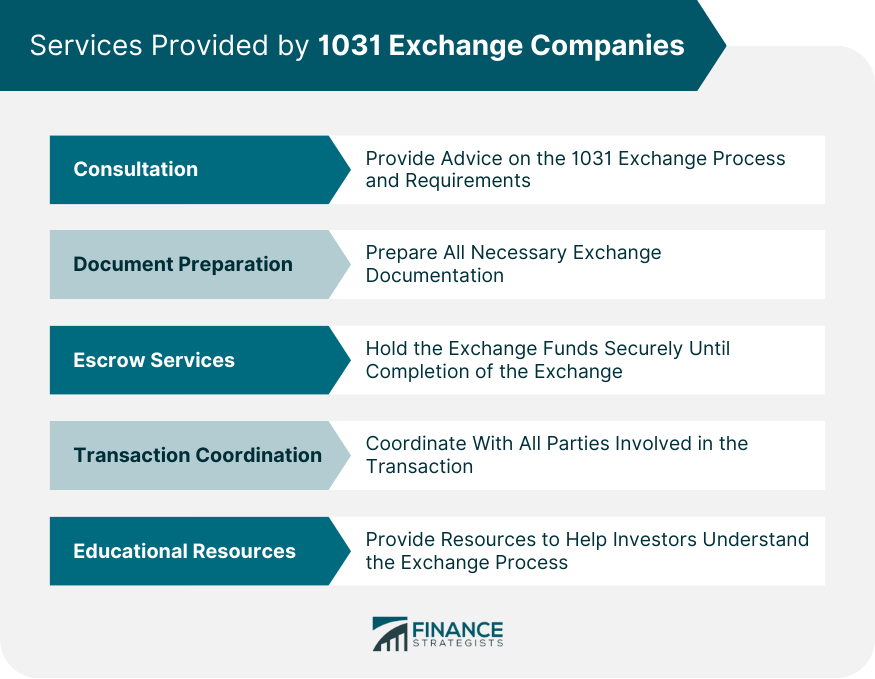
1031 Exchange Process
Sale of the Original Property
Identification of the Replacement Property
Purchase of the Replacement Property
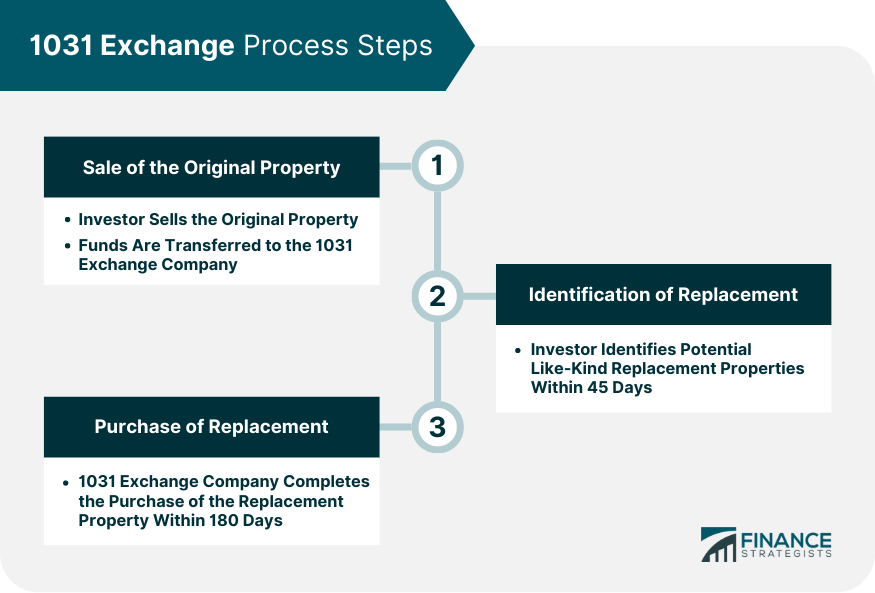
Considerations When Working With a 1031 Exchange Company
Experience and Reputation
Customer Service
Fees and Services
Security Measures
Knowledge and Compliance With IRS Regulations
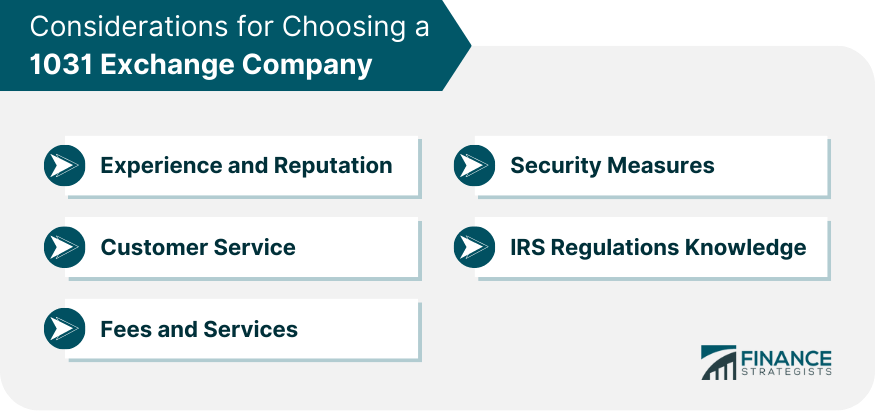
Benefits of 1031 Exchanges Companies
Deferral of Capital Gains Tax
Compound Growth of Investments
Versatility in Investments
Estate Planning Benefits
Leverage Investments
Drawbacks of 1031 Exchange Companies
Strict Deadlines
Choose an Inexperienced or Unreliable Exchange Company
Not Finding a Suitable 'Like-Kind' Property
Inadequate Planning
Mismanagement of Exchange Funds
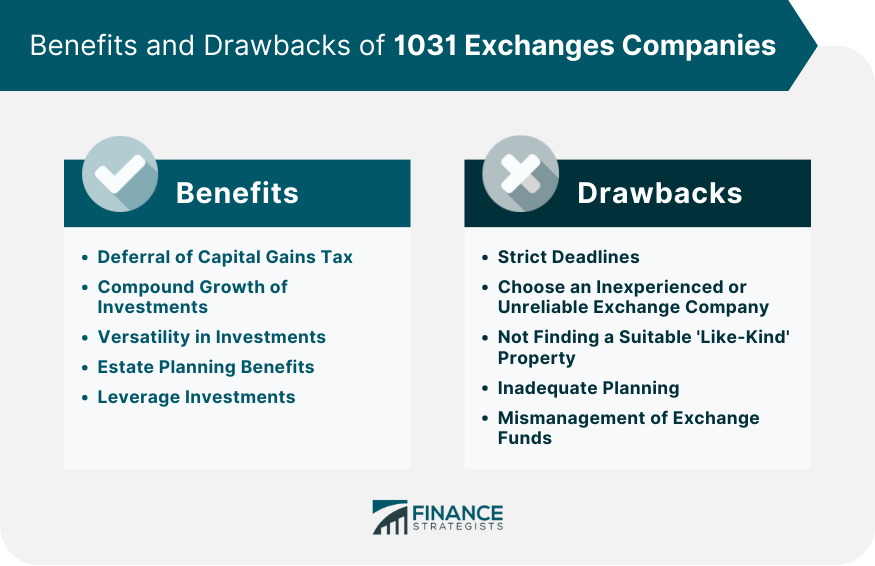
Regulations Governing 1031 Exchange Companies
Legal Obligations of 1031 Exchange Companies
IRS Regulations for 1031 Exchange Companies
Consequences of Non-compliance by 1031 Exchange Companies
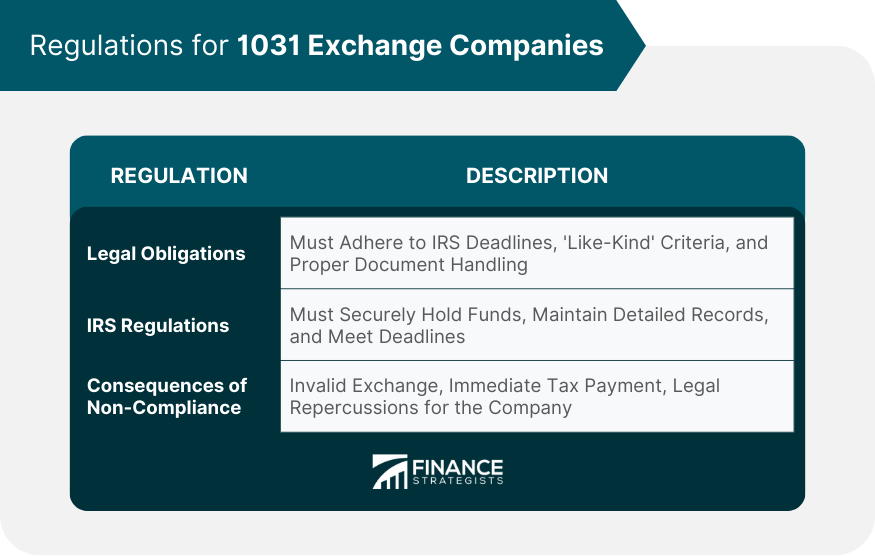
Conclusion
1031 Exchange Companies FAQs
A 1031 Exchange Company, also known as a Qualified Intermediary, is an entity that facilitates property transactions under Section 1031 of the IRS tax code, enabling real estate investors to defer capital gains taxes.
1031 Exchange Companies typically offer services like consultation, preparation of exchange documentation, escrow services for exchange funds, coordination with all transaction parties, and sometimes, educational resources.
A 1031 Exchange Company holds the funds from the sale of the investor's original property in a secure escrow account, assists the investor in identifying a like-kind replacement property, and then uses the funds to acquire the replacement property, ensuring the exchange complies with IRS stipulations.
Consider factors like the company's experience, reputation, customer service, security measures for handling exchange funds, fee structure, and any additional services they offer, such as educational resources or consultation services.
Potential pitfalls can include failure to meet IRS-imposed timelines for identifying and acquiring a replacement property, which could invalidate the exchange. Choosing an inexperienced or unreliable exchange company could also lead to costly mistakes or fraud.
True Tamplin is a published author, public speaker, CEO of UpDigital, and founder of Finance Strategists.
True is a Certified Educator in Personal Finance (CEPF®), author of The Handy Financial Ratios Guide, a member of the Society for Advancing Business Editing and Writing, contributes to his financial education site, Finance Strategists, and has spoken to various financial communities such as the CFA Institute, as well as university students like his Alma mater, Biola University, where he received a bachelor of science in business and data analytics.
To learn more about True, visit his personal website or view his author profiles on Amazon, Nasdaq and Forbes.











